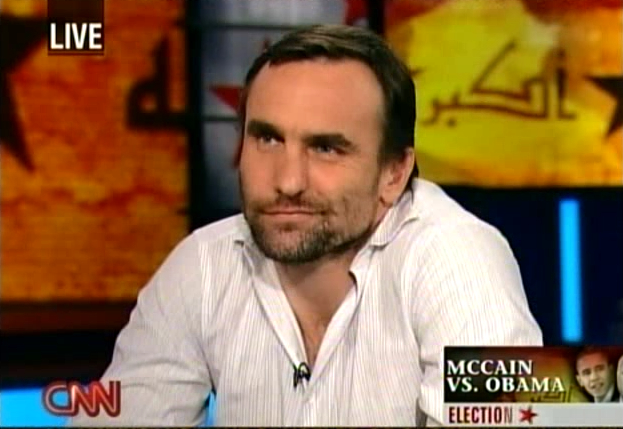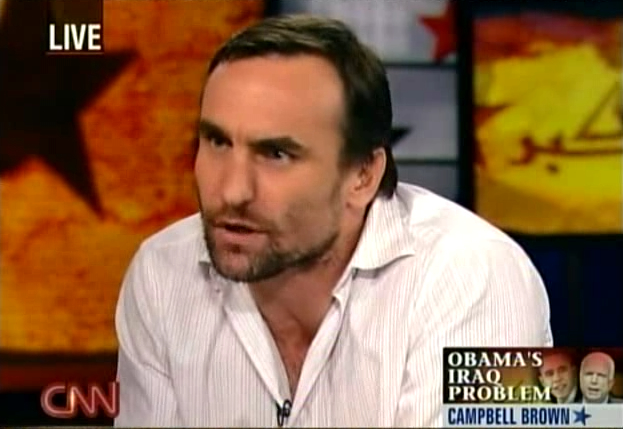EC: "Let's hear him say he knows what it is really going to cost."

Length: 4:50
LARGE (55.8 MB) ----- SMALL (5.8 MB)
Michael appears on Election Center to discuss Obama's trip to Iraq this month and what he should be looking for while there. Soledad O'Brien sits in as host, and the other panelists are Roland Martin and Cliff May (from a conservative think-tank.)
SOLEDAD O'BRIEN: Barack Obama's policy on the Iraq war has been heard loud and clear: end the battle, bring home the troops. Now he's going to Iraq and a possible policy shift is up for discussion. Our experts ready to talk about that tonight.
Cliff May is the president of the Foundation for Defense of Democracy. It's a right-leaning think tank that supports the troop surge. Back again, CNN political analyst, Roland Martin, and here in the ELECTION CENTER, CNN's Michael Ware who has reported for us extensively from Iraq.
Gentlemen, I welcome you all.
Michael, let's begin with you. You know, the McCain camp has been hitting Obama very hard on Iraq, in a lot of ways forced his hand into making this Iraq trip. What do you think the Senator should look for, Senator Obama should be looking for when he goes on this trip?
MICHAEL WARE, CNN BAGHDAD CORRESPONDENT: Well, he wants to get as much of as a reality check as he can possibly hope to have. Yet look, let's be frank, these congressional delegations, these high-powered visits --
O'BRIEN: All the time.
WARE: They're so sanitized, they're so clinical. They can't afford to expose these people to any real danger anyway. So, they're going to get a very filtered, very skewed view. I mean, they're not on the streets. Even the troops don't get the real view.
O'BRIEN: So what should he do to get the real view?
WARE: That's going to be very difficult for him. I think he'd have to think outside of the box. I think he'd have to be prepared to sit down or take some time during his visit within the sanctuary of the Green Zone to speak to some people who are not on the official itinerary, people that the military are not herding towards him. Or perhaps some military voices that aren't being pushed forward, some Iraqi voices that he wouldn't otherwise hear from, at least so he can have a taste.
O'BRIEN: Roland, Barack Obama has been very specific from early on about what he planned to do in Iraq. And now you hear from, I think it was today, David Axelrod, his chief strategist, was talking about, you know, not being wedded to that, taking into account events on the ground. Is that just rational or is that just building up for the flip-flop?
ROLAND MARTIN, CNN CONTRIBUTOR: No, I mean, it is rational. I mean, you have to examine what is happening now. It's sort of like saying, well, a year from now, I'm going to eat this for breakfast. Well, guess what, you go to your doctor, your doctor say you got heart disease, might be changing what you eat. You have to keep that available -
O'BRIEN: But I'm not sure if that analogy -- Roland, let me stop you. Because I'm not sure that that analogy works. Isn't the analogy more like, you say, I'm going to eat such and such for breakfast, I'm going to eat such and such for breakfast. Well, now maybe not so much.
MARTIN: Until your your doctor says different.
O'BRIEN: And everyone else around you says, huh, isn't that a flip-flop?
MARTIN: Until you get a conflicting advice by saying, you know what, not a smart idea. I'm going to change. But here's the issue that I think that he's going to emphasize when it comes to the war. President Bush wants to spend $245 billion this year and next year. The American people are not just saying pull the troops out because they're our troops, they're also looking at the cost of the war and how it's affecting our spending here as well. So it's not just our troops.
O'BRIEN: Cliff, let me ask you a question, to what degree is the Senator really risking eroding his support, his strong support, a lot of it built on the war if in fact he goes and starts taking some of the words from Axelrod?
CLIFF MAY, FOUNDATION FOR DEFENSE OF DEMOCRACIES: He'll certainly absorb some damage from the far left that really does not want the U.S. to prevail in Iraq against al Qaeda and the Iranian-backed militias. But he will be reaching out to the middle which he really has absolutely has to do. Look, it is expensive to fight a war. But it is more expensive to lose a war than to win a war.
The Petraeus mission has been remarkably successful. Iraq now is a nation in which where you have a government. And al Qaeda has been beaten. Al Qaeda said this was the most important battlefront in its global war against us and they are being destroyed there. It is a -
O'BRIEN: Michael Ware is literally rolling his eyes as you speak, Cliff.
WARE: At both of you, for the record.
O'BRIEN: At both of them, why the eye roll?
MAY: Well, you can roll your eyes, but Anbar province, Michael, as you well know, was declared an Islamic emirate by al Qaeda and now Anbar is one of the safest there parts of the country. Do you agree?
WARE: Too true. And the Sunni insurgents, once they went on the U.S. payroll were most effective at assassinating al Qaeda and that's what America paid them to do. But there's long-term implications here. You now have 113,000 Sunni insurgents who are essentially a U.S.-backed militia that are outside and opposed to the U.S.-backed government, which is actually run by Iran. Now, that's going to have long-term implication. Now, as you know --
MAY: As you know, Michael, also, Maliki has been very good about taking on, in Basra and other parts of the country, the Iranian-backed militias, it's been -
WARE: Oh, please, you have got to -- you have to be joking.
O'BRIEN: Stop right there. We're going to pick it up, we're going to pick it up on the other side. No question that the condition on the grounds in Iraq have changed. So should the policy change? We'll talk about that in just a moment right here in the ELECTION CENTER. Stay with us.

Length: 2:49
LARGE (32.6 MB) ----- SMALL (3.4 MB)
O'BRIEN: Even if things get better in Iraq, the war remains wildly unpopular here at home and that makes the political situation even more complicated. So back to talk about that with Cliff May, Roland Martin, Michael Ware.
Michael, let's, before we left, Cliff was talking about -- I think he said Maliki taking on the Iranian-backed militias in Basra.
WARE: Yep. Now look, that's the way that people are trying to sell what's been happening in Iraq but let's face reality. The government that Maliki heads is comprised of Iranian-backed factions. I mean, General David Petraeus himself confirms that the president of Iraq is an agent of influence for Iran. So all we're seeing is one Iranian-backed faction tussling with another Iranian-backed faction vying for political power.
O'BRIEN: Does it make sense, then, Cliff, to say, okay, things have gotten better, now it's time to go?
MAY: Yes, it's time to go slowly. What I would say Obama needs to do is to sit down and talk with General Petraeus and General Odierno and say to them, at what the rate can we get out safely and manage to sustain all the progress that we have, rather than give it up, because we've paid for the progress, and there has been progress, I think even Michael would agree with that. That progress we must not simply sacrifice for a timetable and that can be done -- Petraeus and Odierno are the ones who can help him do that. He needs to show that he will listen to his generals.
MARTIN: First, he said -- when I interviewed him right on CNN, he said, I win the presidency, first agenda in January, I'm sitting down with the Joint Chiefs of Staff, do exactly what you just said. So that's not out of the ordinary. And so, look, this is ...
MAY: Roland, then.
MARTIN: ... still unpopular with the American people. And at some point, though, the Iraqis do to assume control of their own country. We can not be big brother forever.
MAY: Roland, Roland, you're right, and they are assuming control little by little. He has not yet -- Obama has not yet talked with Petraeus --
MARTIN: No, not little -- we need more --
MAY: And Odierno and that's who he needs to talk with and he hasn't been in Iraq since the surge began.
O'BRIEN: Guys, I'm going to give the final word to Michael Ware because he's the only person not yelling right now, which even makes me love you even more, Michael.
WARE: That's a rarity. I mean, and one thing I'd like to hear from Senator Obama, it's fine to have this notion to pull the troops home. I mean who isn't tired? Who doesn't want the troops to come home?
O'BRIEN: And you do the math, we need the money.
WARE: Right, but I want to hear Senator Obama say he's prepared to pull those troops out while listing all the costs to American power, interest and status, not to mention the slaughter that almost certainly will follow. Then he can say that he's ready to pull the troops out. Let's hear him say he knows what it is really going to cost.
O'BRIEN: We'll see what he says. Michael Ware joining us tonight. Also, Cliff and Roland. Thanks, guys. I appreciate it. That's it for "Election Center" tonight.
